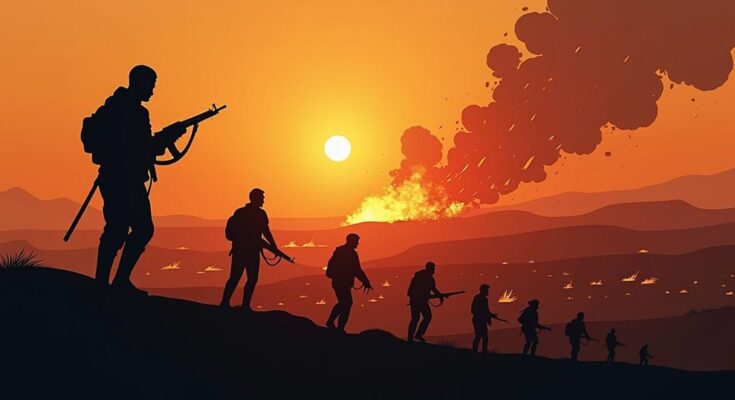In a week marked by unprecedented violence, Hezbollah leader Hassan Nasrallah was assassinated, Israel invaded Lebanon, and Iran launched a significant missile attack on Israel. Diplomatic efforts for de-escalation are failing, as the Middle East faces heightened tensions that could lead to all-out war. The situation remains volatile with Israel’s military focus on both Gaza and Hezbollah, while international actors like the U.S. strive to mitigate further conflict.
In recent days, the Middle East has experienced an escalation in conflict, bringing the region perilously close to all-out war. This surge in violence was marked by several significant events: the assassination of Hezbollah leader Hassan Nasrallah, Israel’s ground invasion of Lebanon, and Iran’s launch of approximately 200 ballistic missiles targeting various locations in Israel. Global powers, particularly the United States, have been advocating for de-escalation. Concurrently, the United Nations Security Council has urged for an immediate cessation of hostilities, while the G7 countries have implored all parties to exercise restraint. However, these diplomatic efforts have thus far been ineffective, leaving the situation in the Middle East more precarious than ever. The sequence began with Nasrallah’s assassination on Friday evening, September 27. As explosions rocked southern Beirut, the targeted strike resulted in the death of the notorious Hezbollah leader, who had not been publicly visible for years due to threats on his life. This attack followed a week of intensified Israeli operations against Hezbollah, which had already led to significant casualties, and effectively eliminated any lingering hopes for diplomatic resolution. By the following Monday, Israel launched a ground invasion into Lebanon. The Israeli Defense Forces (IDF) characterized their mission as limited and precise. Despite this assertion, the offensive has already displaced approximately 1.2 million people within Lebanon, while resulting in the deaths of at least eight Israeli soldiers. This ground engagement comes amid ongoing hostilities in the Gaza Strip, a situation that has not occurred concurrently for decades, demonstrating Israel’s commitment to reducing Hezbollah’s operational capabilities. On Tuesday, Iran further escalated the conflict by firing nearly 200 ballistic missiles into Israel, a drastic move intended to restore regional deterrence. While most missiles were intercepted, some did impact central and southern Israel, resulting in casualties. Despite the increased aggression, experts suggest that Iran is cautious about provoking an outright war, recognizing its vulnerability in such a confrontation. As tensions climb, Hezbollah has declared its intention to continue fighting against Israel. Although the Israeli military has clear objectives, including achieving complete victory in Gaza and nullifying Hezbollah’s threat at the northern frontier, the complexities of regional warfare present significant challenges. Additionally, U.S. President Joe Biden has advised Israel against targeting Iranian nuclear sites or oil facilities, indicating a restrained approach from international allies as the situation develops. With numerous actors involved and complex historical narratives at play, the potential for a broader conflict looms, yet it is essential to recognize that an all-out regional war has not yet materialized. The developments in Gaza have escalated tensions dramatically, and observers worldwide remain vigilant regarding the evolving dynamics of the situation.
The current escalation in the Middle East is rooted in longstanding geopolitical tensions involving Israel, Hezbollah, and Iran, among other players. The region has been susceptible to armed conflict, particularly following events such as the 2006 war between Israel and Hezbollah. More recently, the rise of Hamas and the ongoing instability in the Gaza Strip have further complicated relations. The assassination of key figures like Hassan Nasrallah signifies critical turning points, triggering military responses that heighten the overarching fear of regional warfare. With multiple fronts of conflict persisting across the Middle East, a resolution remains elusive amidst continual hostilities.
In summary, the events of the past week have intensified the conflict in the Middle East, bringing the region closer to the brink of all-out war. The assassination of Hassan Nasrallah, coupled with Israel’s ground invasion of Lebanon and Iran’s missile attacks, signal a profound escalation in hostilities. While global diplomatic efforts seek to curtail violence, the complex web of alliances and enmities continues to complicate peace processes, leaving many to ponder the future stability of the region amidst these crises.
Original Source: www.bbc.com




